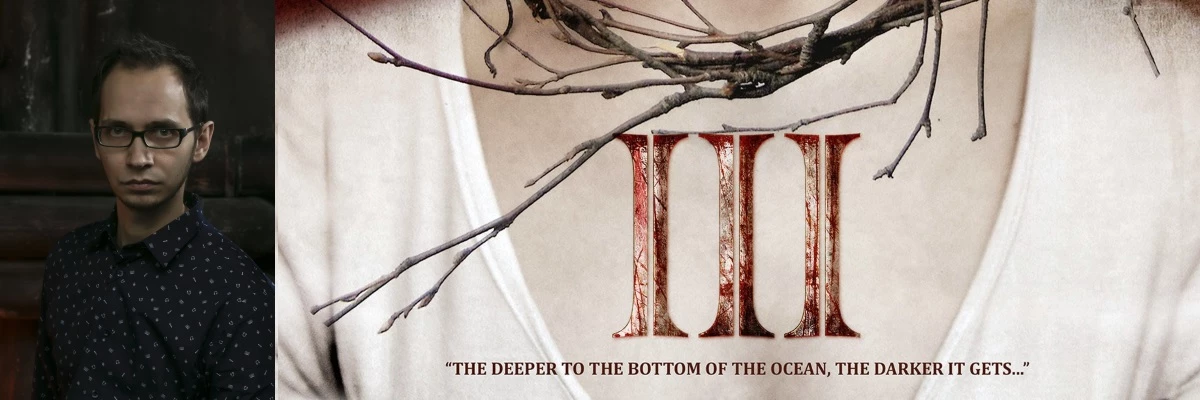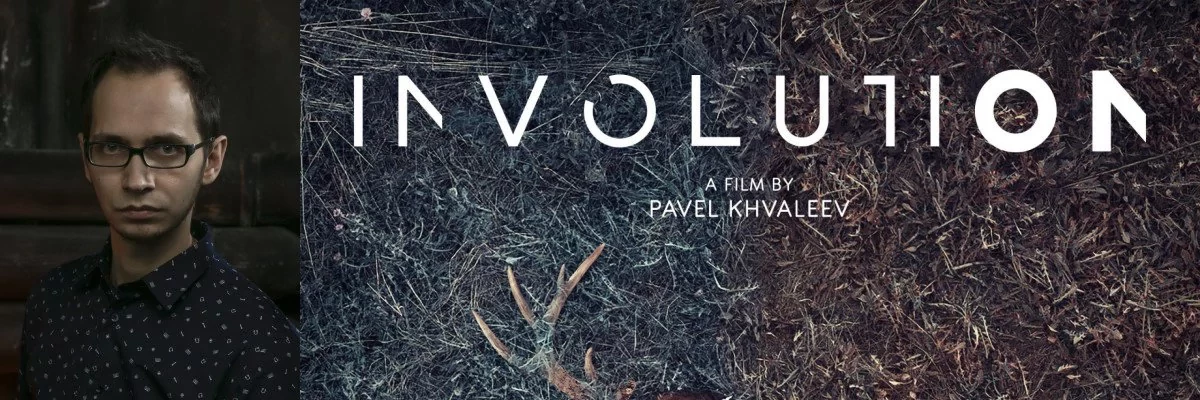Pavel Khvaleev - III and Involution
To say III is a divisive film is an understatement, but if you love fantasy, mystery and horror it's a film that begs to be seen. With a budget of only 15.000 EUR, Pavel Khvaleev directed one of the best films I've seen all year. A perfect excuse to grill him about this success story. If you want to know more about making films on a shoestring budget, about the Russian horror scene and what's next for Pavel Khvaleev, you'll find all the answers right below.

Niels Matthijs: You started out as DJ/producer in Moonbeam, an electronic/dance project you set up together with your brother. From there on out you started to direct your own music videos and finally you ended up doing your own feature films. Are you a creative genius or did you get any formal training in music/film?
Pavel Khvaleev: Unfortunately, I didn't get any formal music or film education. To some extent that's an omission since you have to spend a lot of time learning everything by yourself. But on the other hand, this lack of formal education doesn't appear to burden me. In a creative sense it’s actually better as it does not set any limitations for me. All my mistakes come from my personal experience and I am the only one who is responsible for them. It turns out that vision comes from within, not from outside. At the moment, music and cinema stand united for me.
While watching III there were only a select few moments where I could see signs of the limited budget you worked with. I kind of figured III was a low-budget production, but when I heard the film cost only 15,000 EUR I pretty much fell out off my chair. How did you manage to keep the production cost so incredibly low?
That’s right, we spent 15,000 EUR on III. First of all, this amount was so small because everyone was working out of pure enthusiasm, simply believing in the future of our film. The main expenses were related to the rental of locations, the prosthetics and the trip to Germany with our entire team. Secondly, the entire post-production, editing, CG effects, color corrections, sound and music were done by me at home, so that also played a major role in keeping the film budget low.
Looking at the credits (people doing multiple jobs, family members and friends in the crew) it's clear this is a project born out of passion. These things either turn out really well or they end up amateurish crap. Were you ever afraid you might not be able to pull it off?
We were just doing what we all liked, not even realizing that it could be bad. Even if it had turned out to be crap, the worst that could've happened was that we wouldn't have received any invitations to international festivals and we wouldn't have received any awards. We would've just presented the film in our city and hopefully it would have been quickly forgotten. But things turned out completely different and we are sincerely surprised and happy with this. So, now we can continue to develop the genre of indie films.
Great creature design is rare in horror films, I must say III really nailed that part. Who came up with the designs and how did you translate them that well to the screen which such limited resources?
Thank you for the compliment! Probably the most important thing we had to learn was to find the delicate balance between dilettantism and quality level. We did experience some difficulties with certain scenes, but we managed to cope. This was our first experience on such a large scale project, despite the fact that we had to learn many professions on the spot, such as how to do all the prosthetics work. Together with Evgenia Zakharova we spent a lot of time creating the monsters from scratch.
One of the most interesting critiques I've read about III is that it would feel too much like a music video. Personally I feel the score is a very overlooked part of film making and even when the music itself is nice, there's usually very limited interaction with the visuals. Was this something you paid attention to or did it come natural?
Music is part of my life and apparently I failed to hide my special relationship to it during the editing process. To some extent, it was also done on purpose: it was an attempt to immerse the viewer in the atmosphere through the music and through the observation of nature. Nowadays, audiences are so used to dynamic and controversial plots because commercial films have set such a standard. But we wanted to create a more layered world of characters. I now understand that it can be a positive hallmark of our work.
I read you found general inspiration in films like The Cell and Silent Hill, personally I got a slight Avalon (Mamoru Oshii) vibe from III. Any other important sources of inspiration that influenced the way III turned out to be?
Oddly enough, it were the paintings of Hieronymus Bosch that we used as a reference from the very start of the project. His special relationship with religion and his artful depiction of monsters perfectly matched the mood of III. Just before starting work on the scenario we saw his paintings in the Prado Museum, which influenced us all a lot. Then of course there's my own music, which has always been filled with quite minor atmospheric tones.
Russia has a reputable cinematic history, but the past 10 years or so not many Russian films have reached us here in the West. There's Aleksandr Sokurov on the arthouse side and Timur Bekmambetov handling some more commercial projects, but that's about all I can come up with. What happened?
I have the same question as a viewer. In my opinion, there is no such thing as “healthy professional competition” in Russia at the moment, which ultimately drives film art (like, for example, in Hollywood). Film crews led by directors and producers often have one single goal in mind – getting rich. And nobody cares what they produce as long as in the end they receive the money.
Take for example Tarkovsky or Parajanov, who both became renowned around the world for directing films with unique and deep stories. They stood out from the crowd, which is the real key to being successful abroad. I think it’s time for a new generation of film makers who will change that situation and who will bring something very personal to film production, instead of seeking imitation.
Why did you choose to do a horror film? Russia doesn't really have a history in horror cinema and even though horror fans are known to watch just about everything that is labeled as horror, they usually don't take well to films that deviate from established niches?
This genre is only emerging in Russia now. As it turns out, a couple of years ago young Russian filmmakers somehow started realizing all at the same time that this niche was almost unexplored, so they al started working in this direction. With III, we’ve tried to make a film on the verge of genres, to make it deeper, which is something you cannot always find in horror movies.
Why are there so few genre films coming from Russia? Is there something structural blocking such movies from being made, or is there simply a general lack of interest in genre cinema?
There is nothing preventing genre films from appearing, except the factor of low demand for them in our own country. And to get any attention abroad, a Russian film must be truly unique and original.
For example, last year Brussels was covered with posters of an independent film called Hard to Be a God by Alexis Herman. This surprised us very much, because in Russia this film was only shown in small independent theaters.
2016 is shaping up to be a great year for Russian genre cinema though. Ilya Naishuller's Hardcore Henry made big waves and now III managed to land a Netflix deal. Do you feel something is changing in Russia or is this just a coincidence?
As far as I know, there were difficulties while shooting Hardcore Henry. To finish the film they had to raise money through some kind of a crowdfunding campaign. We were shooting III entirely with our own money and thanks to the success at film festivals and through the work of our producer Frank Ellrich we landed a global release on Netflix. But the main problem in Russia is a complete lack of support for genre films from the state, so we can rely only on ourselves.

I saw you're already working on your next project [Involution: site / trailer] which is looking to be a post-apocalyptic scifi. That's raising the bar considerably. Will it be something completely different or are you looking to build on what you already established with the previous films you did?
As for the picture's budget, it will be bigger than that of III, as we’ve expanded our team a little, inviting 3D artist Aleksey Poplavsky and one more producer, Olga Feshchenko. I again will be doing all post-production and music on my own, while my wife Alexandra is responsible for the screenplay and the original story. We want to take this film to the next level, which we'll try to achieve with the help of the cast, some crowd scenes and bigger opportunities to implement our ideas.
And as we did in III, we also will continue to play with unusual surreal scenes, such as dreams and immersions, allowing the viewer to see the inner world of our characters. This will once again involve large-scale work with the production of props and some 3D modeling.
What if I would give you 5 million EUR to spend on Involution? Where would you put that money? Or do you prefer to work with smaller budgets, doing everything with a small, tight-knit crew around you?
Of course, a bigger budget would have helped us to implement bolder and more creative ideas, because in both III and Involution we have to think about money limitations first, only then can we further develop our ideas. With 5 million EUR we could afford to cast actors with well-known names, as well as construct film sets and use more advanced equipment for filming (cameras, lenses, cranes and other devices). This could help to bring in new ideas, new angles and to feel creative freedom to the fullest extent. But our production team would still be quite small, though very loyal.
How difficult is it to combine directing feature films with making music and touring? Is it something you'll be able to combine in the future or will you have to choose between one of the two (and if so, which one are you most likely to keep doing?)
This year my brother and I shut down our Moonbeam project that has successfully existed for 12 years, so now I have a little break just to fully engage myself in the creation of Involution. But after that, I will once again return to music. I'm afraid I would never be able to choose just one thing, so I will find some way to combine those two .